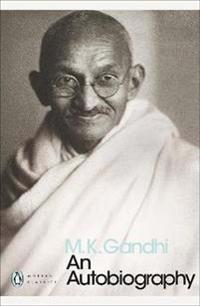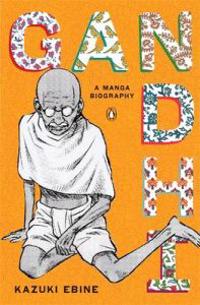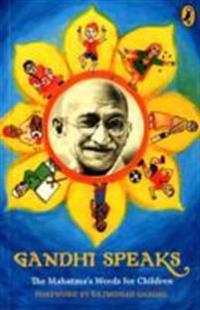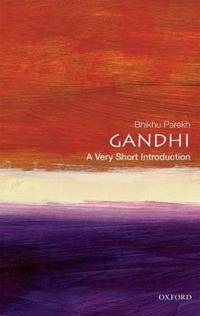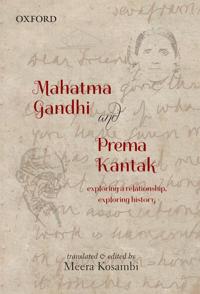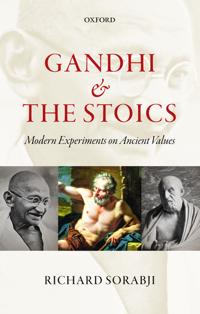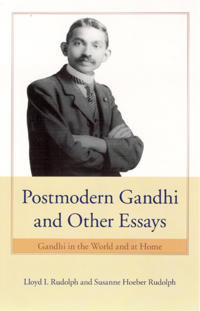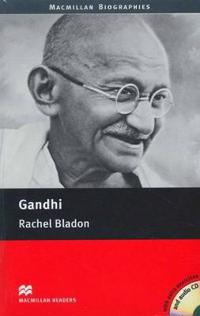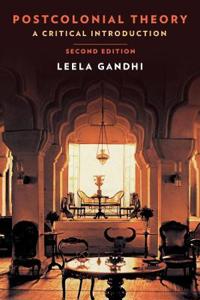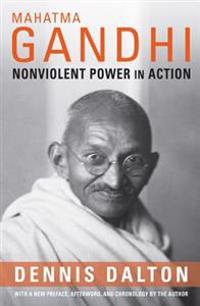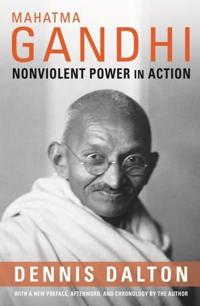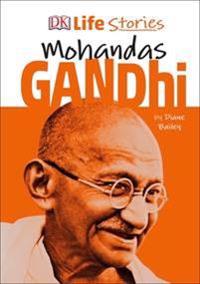An Autobiography (Storpocket)
avMahatma Gandhi
ISBN: 9780141186863 - UTGIVEN: 200109Gandhi's non-violent struggles against racism, violence, and colonialism in South Africa and India had brought him to such a level of notoriety, adulation that when asked to write an autobiography midway through his career, he took it as an opportunity to explain himself. He feared the enthusiasm fo[...]
Indira Gandhi (Häftad)
avNayantara Sahgal
ISBN: 9780143067351 - UTGIVEN: 2012-09A nuanced and critical biography of Indira Gandhi by a member of the Nehru family How did Indira Gandhi reach the pinnacle of Indian politics? Did India move away from freedom under her leadership? What kind of woman was she?[...]
Gandhi (Häftad)
avKazuki Ebine
ISBN: 9780143120247 - UTGIVEN: 201201Through his quietly powerful leadership and influential use of nonviolent resistance in India's struggle against the British Raj, Mahatma Gandhi became one of the most revered figures of the modern era. While history has recorded Gandhi's words and deeds, the man himself has been eclipsed by maxims [...]
Gandhi (Häftad)
avBhikhu Parekh
ISBN: 9780192854575 - UTGIVEN: 200102Gandhi (1869-1948) was one of the few men in history to fight simultaneously on moral, religious, political, social, economic, and cultural fronts. During his time as a lawyer in South Africa he developed his strategy of non-violence: the idea of opposing unjust laws by non-violent protest, which he[...]
Factfiles: Gandhi (Häftad)
ISBN: 9780194237802 - UTGIVEN: 2010-04Who will speak for the poor? Who will listen to slaves, and those who have no rights? Who will work for a future where everyone is equal? Who will give up his house, job and money to fight for people who are shut out by everyone else? 'I will,' said Mohandas Gandhi. And he began to fight in a way th[...]
Gandhi (Övrigt)
ISBN: 9780194237833 - UTGIVEN: 2010-04Who will speak for the poor? Who will listen to slaves, and those who have no rights? Who will work for a future where everyone is equal? Who will give up his house, job and money to fight for people who are shut out by everyone else? 'I will,' said Mohandas Gandhi. And he began to fight in a way th[...]
Mahatma Gandhi and Prema Kantak (Inbunden)
avMeera Kosambi
ISBN: 9780198082934 - UTGIVEN: 2013-07An important feminist thinker, writer, and activist, Prema Kantak's contributions to Indian feminist thought and the nationalist movement have been largely neglected in scholarly studies. Kantak, a one-time resident of Gandhi's ashram, forged a special, life-long bond with the Mahatma, and was hugel[...]
Gandhi and the Stoics (häftad)
ISBN: 9780198708667 - UTGIVEN: 2016-12Richard Sorabji presents a fascinating study of Gandhi's philosophy in comparison with Christian and Stoic thought. Sorabji shows that Gandhi was a true philosopher. He not only aimed to give a consistent self-critical rationale for his views, but also thought himself obliged to live by what he taug[...]
True Lives: Gandhi (Pocket)
avPratima Mitchell
ISBN: 9780199119677 - UTGIVEN: 2009-04-02A biography of Mahatma Gandhi, the Indian statesman who led his country to freedom from British rule through his policy of nonviolent resistance.[...]
Gandhi And The Stoics (Inbunden)
avRichard Sorabji
ISBN: 9780199644339 - UTGIVEN: 2012-09-27Richard Sorabji presents a fascinating study of Gandhi's philosophy in comparison with Christian and Stoic thought. He shows that Gandhi was a true philosopher, who not only aimed to give a consistent self-critical rationale for his views, but also thought himself obliged to live by what he taught.[...]
Common Cause, The: Postcolonial Ethics and the Practice of Democracy, 1900-1955 (Inbunden)
avLeela Gandhi
ISBN: 9780226019871 - UTGIVEN: 2014-04-04Common Cause, The: Postcolonial Ethics and the Practice of Democracy, 1900-1955 (Pocket)
avLeela Gandhi
ISBN: 9780226019901 - UTGIVEN: 2014-04-04Postmodern Gandhi And Other Essays
ISBN: 9780226731247 - UTGIVEN: 2006-10Gandhi, with his loincloth and walking stick, seems an unlikely advocate of postmodernism. But in "Postmodern Gandhi," Lloyd and Susanne Rudolph portray him as just that in eight thought-provoking essays that aim to correct the common association of Gandhi with traditionalism.Combining core sections[...]
Macmillan Readers Gandhi Pre-intermediate Level (Pocket)
avRachel Bladon
ISBN: 9780230408388 - UTGIVEN: 2010-12-21Presents a graded series of retold versions of popular classic and contemporary titles and specially written stories such as: "Gandhi", "Much Ado About Nothing", and "The Importance of Being Earnest".[...]
Macmillan Readers Gandhi Pre-intermediate (Övrigt)
avRachel Bladon
ISBN: 9780230408692 - UTGIVEN: 201012Mohandas Gandhi was one of the most influential leaders and civil rights campaigners that the world has ever known. This biography tells the story of Gandhi's life and achievements.[...]
Postcolonial Theory (Häftad)
avLeela Gandhi
ISBN: 9780231112734 - UTGIVEN: 199804Postcolonial Theory is a ground-breaking critical introduction to the burgeoing field of postcolonial studies.Leela Gandhi is the first to clearly map out this field in terms of its wider philosophical and intellectual context, drawing important connections between postcolonial theory and poststruct[...]
Mahatma Gandhi (Häftad)
avDennis Dalton
ISBN: 9780231122375 - UTGIVEN: 200101Featuring a new preface by the author, this book moves from the birth of Gandhi's method of nonviolent resistance in South Africa to an in-depth analysis of two of his signal triumphs: the civil disobedience movement of 1930 and his historic Calcutta fast of 1947. By focusing on these critical years[...]
Gandhi in His Time and Ours (Inbunden)
ISBN: 9780231131148 - UTGIVEN: 2004-03Gandhi was the creator of a radical style of politics that has proved effective in fighting insidious social divisions within India and elsewhere in the world. How did this new form of politics come about? David Hardiman shows that it was based on a larger vision of an alternative society, one that [...]
Mahatma Gandhi: Nonviolent Power in Action (Övrig)
avDennis Dalton
ISBN: 9780231159586 - UTGIVEN: 2012-03-02Dennis Dalton's classic account of Gandhi's political and intellectual development focuses on the leader's two signal triumphs: the civil disobedience movement (or salt satyagraha) of 1930 and the Calcutta fast of 1947. Dalton clearly demonstrates how Gandhi's lifelong career in national politics g[...]
Mahatma Gandhi (Häftad)
avDennis Dalton
ISBN: 9780231159593 - UTGIVEN: 201203Dennis Dalton's classic account of Gandhi's political and intellectual development focuses on the leader's two signal triumphs: the civil disobedience movement (or salt satyagraha) of 1930 and the Calcutta fast of 1947. Dalton clearly demonstrates how Gandhi's lifelong career in national politics g[...]
DK Life Stories Gandhi
ISBN: 9780241356333 - UTGIVEN: 2018-12In this biography, discover the inspiring life story of Mohandas Gandhi, who successfully used his teachings of non-violence to win his country's freedom.Mohandas Gandhi was born at a time when his home country was choked under the oppression of British rule. Although many thought that violence was [...]
Clothing Gandhi's Nation (Inbunden)
avTrivedi, Lisa
ISBN: 9780253348821 - UTGIVEN: 2007-06-15In Clothing Gandhi's Nation, Lisa Trivedi explores the making of one of modern India's most enduring political symbols, khadi: a homespun, home-woven cloth. The image of Mohandas K. Gandhi clothed simply in a loincloth and plying a spinning wheel is familiar around the world, as is the sight of Gand[...]


